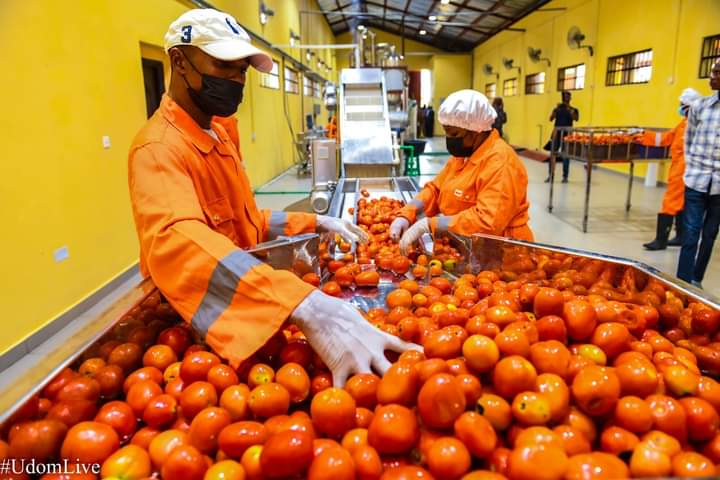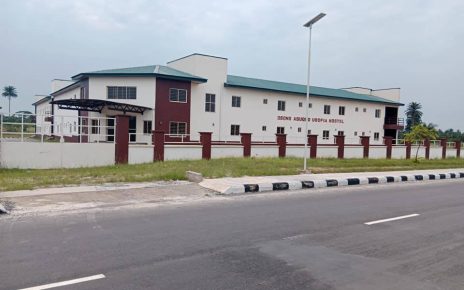By Ukpong Ukpong
FIRST THINGS FIRST
There has been a couple of interesting feedback from my last write-up on the dilemma Akwa Ibom state might face if action is not taken to ramp up production of tomatoes within the state now that we have a functional tomato processing factory. As a matter of fact, we must learn from challenges faced in producing coconuts to feed the coconut oil refinery in Ikot Akpan Okop – Mkpat Enin, which is perhaps operating below installed capacity.
Most of the feedback were positive from similarly concerned stakeholders, who wish to see the industry attain its promised potential, while an insignificant few came from misguided attack dogs who bark at any perceived criticism of government. Well, one didn’t spend seven years of learning a vocation to end up joining issues with losers. As a journalist sworn to safeguard public interest, yours truly is determined to use acquired knowledge in agro enterprise to provide oversight on policies, programs and projects that are meant to ease the struggle of entrepreneurs and better lives of people.
Without need for validation from anyone even though I got introduced into horticulture by chance, from acquired hands-on knowledge it’s easy to understand how commercial production of vegetables works – from farm to consumer and everything in between.
As the General Manager of Benny Group, the Agro consultancy firm that mid-wived the vegetable revolution, the writer was part of a team that managed simultaneously over 100 hectares of vegetable farms across the state and have been involved in training hundreds of youths over time in planning, financials, farm setup and management, input and maintenance, marketing and sales as well as value chain.
There is need to set agenda for the Umo Eno administration as he embarks on the task to drive enterprise and create wealth, building upon what the immediate past administration did through the Ministry of Trade and Investment. Government has thrown a challenge by setting up a tomato factory that needs tonnes of fresh tomatoes to keep it working. Can we meet this challenge? Yes. But, steps taken to meet the challenge could either make this factory a high value revenue earner that creates wealth for players on the entire tomato value chain or a failure that, goes down history as another white elephant project.
SITUATIONAL ANALYSIS
In 2015, a survey was conducted by a consulting firm for Akwa Ibom Enterprise and Employment Scheme, AKEES, which revealed that Akwa Ibom State spends over ₦1.2 billion daily to feed more than 3 million citizens, that is, at least ₦400 daily per head. Also, over 40% of our dietary intake are vegetables primarily onions, peppers, tomatoes, okra, leafy greens and several others.
More than 70% of this daily vegetable intake was sourced from external markets in the North and neighbouring countries such as Cameroon, meaning over ₦350 million left our economy to feed our daily vegetable consumption then and certainly much more is leaving currently.
Source: Thazis Nigeria Limited
Meanwhile, insecurity in the North East and North Central Nigeria, which were traditional primary producers of vegetables and grains as well as pirate activities in the creeks of the Niger Delta, have tripled the cost of acquiring and bringing in these food stuffs from either the north through land or neighbouring countries through sea.
Many may see these as existential threats, but they actually offer enterprising Akwa Ibom youths great opportunities to ARISE and invest aggressively in producing these food crops to feed the nation, provide massive employment for themselves, create wealth for our people and push further the frontiers of industrialization.
WHAT IS AKWA IBOM SMART EMPOWERMENT AND ENTERPRISE DEVELOPMENT SCHEME (AK-SEEDS)?
Akwa Ibom Smart Empowerment and Enterprise Development Scheme, AK-SEEDS is a doctrine of institutionalizing commercial vegetable production as a vocation in Akwa Ibom State. AK-SEEDS is a product of almost a decade of careful research and documentation of the impact of Akwa Ibom State Government investment in fast yielding commonly consumed vegetables as a vehicle for massive youth empowerment, food security and wealth creation.
To be continued…





